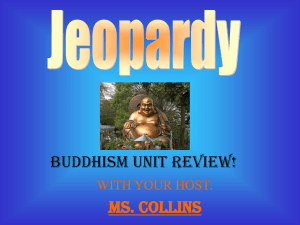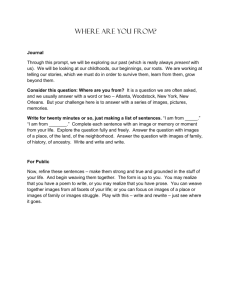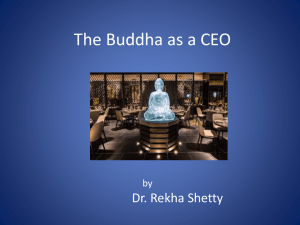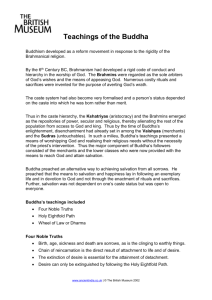THREE BENEFITS OF OLD AGE
advertisement
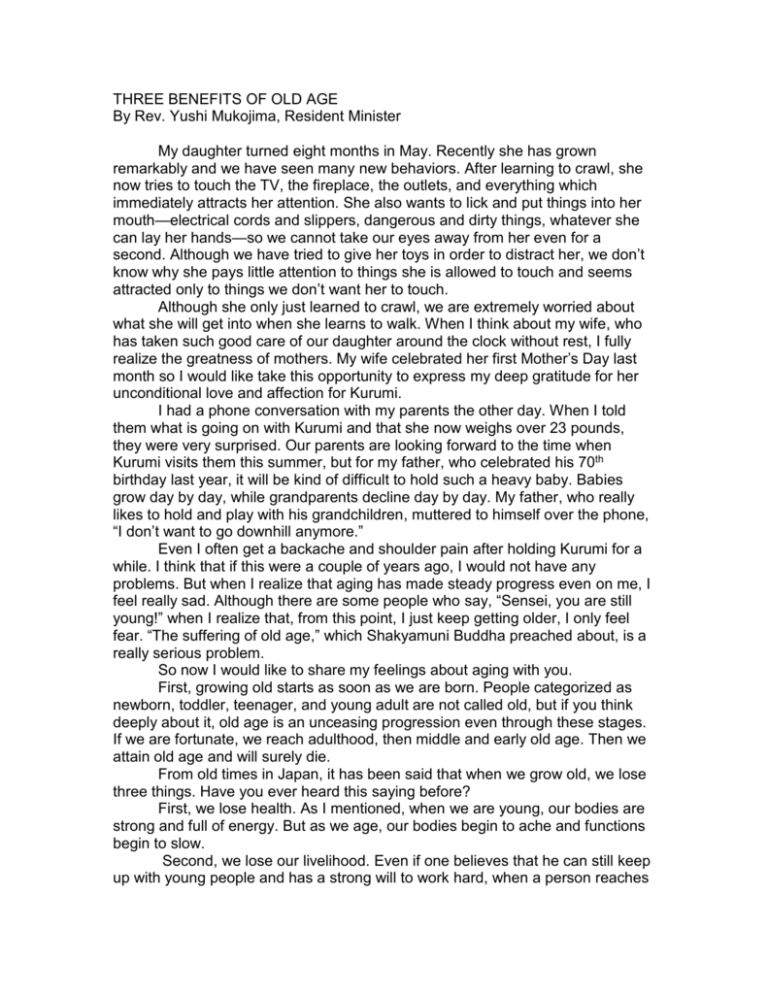
THREE BENEFITS OF OLD AGE By Rev. Yushi Mukojima, Resident Minister My daughter turned eight months in May. Recently she has grown remarkably and we have seen many new behaviors. After learning to crawl, she now tries to touch the TV, the fireplace, the outlets, and everything which immediately attracts her attention. She also wants to lick and put things into her mouth—electrical cords and slippers, dangerous and dirty things, whatever she can lay her hands—so we cannot take our eyes away from her even for a second. Although we have tried to give her toys in order to distract her, we don’t know why she pays little attention to things she is allowed to touch and seems attracted only to things we don’t want her to touch. Although she only just learned to crawl, we are extremely worried about what she will get into when she learns to walk. When I think about my wife, who has taken such good care of our daughter around the clock without rest, I fully realize the greatness of mothers. My wife celebrated her first Mother’s Day last month so I would like take this opportunity to express my deep gratitude for her unconditional love and affection for Kurumi. I had a phone conversation with my parents the other day. When I told them what is going on with Kurumi and that she now weighs over 23 pounds, they were very surprised. Our parents are looking forward to the time when Kurumi visits them this summer, but for my father, who celebrated his 70th birthday last year, it will be kind of difficult to hold such a heavy baby. Babies grow day by day, while grandparents decline day by day. My father, who really likes to hold and play with his grandchildren, muttered to himself over the phone, “I don’t want to go downhill anymore.” Even I often get a backache and shoulder pain after holding Kurumi for a while. I think that if this were a couple of years ago, I would not have any problems. But when I realize that aging has made steady progress even on me, I feel really sad. Although there are some people who say, “Sensei, you are still young!” when I realize that, from this point, I just keep getting older, I only feel fear. “The suffering of old age,” which Shakyamuni Buddha preached about, is a really serious problem. So now I would like to share my feelings about aging with you. First, growing old starts as soon as we are born. People categorized as newborn, toddler, teenager, and young adult are not called old, but if you think deeply about it, old age is an unceasing progression even through these stages. If we are fortunate, we reach adulthood, then middle and early old age. Then we attain old age and will surely die. From old times in Japan, it has been said that when we grow old, we lose three things. Have you ever heard this saying before? First, we lose health. As I mentioned, when we are young, our bodies are strong and full of energy. But as we age, our bodies begin to ache and functions begin to slow. Second, we lose our livelihood. Even if one believes that he can still keep up with young people and has a strong will to work hard, when a person reaches retirement age, he must leave his job, his company, school, or workplace. Even an executive at his firm who handles his work competently must eventually give up his high position to the next generation. Third, we lose our companions. Inevitably, we lose the partner with whom we shared life together for a long time. Even the couple who quarreled constantly throughout their relationship will eventually be separated by death. Even our dear old friends will depart from us. We call this the Three Great Losses of Old Age. However, when I was at the university, my teacher told us an interesting story which challenges this old saying. He said that a person who listens to the Nembutsu teaching will be able to gain, rather than lose, three important things. What is it that can only be gained by growing old? First, as one grows older, one becomes more agreeable. Even a person who lived abrasively or stubbornly in his youth, wanting to be second to none, will mellow out and develop a benevolent mind and a gentle look, like Buddha’s, as he gets older. Even a parent who was very rigid in disciplining his children will grow more relaxed over the years. Certainly, my father was very strict with me when I was child and I remember clearly that I was often scolded for bad behavior. However, as I see my father now, his gaze at his grandchildren when dandling them is very calm and it is as if I were looking at Buddha. Second, with the Nembutsu teaching, one can have a rich experience in tasting both the sweetness and bitterness of life. By understanding impermanence, which is hard to grasp in one’s youth, we will be able to live life treasuring each day. We can go through life doing our best to carry out tasks which can be finished today and never put them off until tomorrow. And one who fully realizes that the nature of life has always been to support one another, will never hurt others’ feelings, but live treasuring the harmony of others. At this stage, one accepts a mission to hand down this spirit to the next generations. What is important is not to tell younger people what to do but to show them by one’s quiet daily practice. I believe that sutra chanting before the Obutsudan every morning and evening at home, and joining the Sunday Service at the temple, are habits that will be handed down like this. Third is that we can enjoy a deep and meaningful life by living each day based on the first two benefits. This way of life values each day with the deepest feeling of gratitude for the blessings which allow us to be alive. Rather than focus on Three Great Losses of Old Age, my teacher told us to consider the Three Great Benefits made possible through the Nembutsu teaching. These are very important gifts which we only receive with old age. Certainly, as we attain old age, we assume we will lose many advantages. To the contrary, we also gain a precious way of life of immeasurable depth. I hope that each of us will treasure and rejoice in the precious three benefits assured by the Nembutsu teaching which make old lives shine more and more brilliantly. In Gassho...




